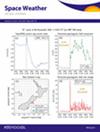Performance Analysis of a Strong Constraint 4DVar and 4DEnVar on Regional Ionosphere Imaging
IF 3.7
2区 地球科学
引用次数: 0
Abstract
Data assimilation (DA) techniques have recently gained traction in the ionospheric community, particularly at regional operational centers where more precise data are becoming prevalent. At center stage is the argument over which technique or scheme merits realization. At 4DSpace, we have in-house developed and assessed the performance of two regional flavors of short-term forecast strong constraint four-dimensional (4D, space and time) variational (SC4DVar) DA schemes; the orthodox incremental (SC4DVar-Inc) and ensemble-based (SC4DEnVar) approach. SC4DVar-Inc is bottled-necked by expensive Tangent Linear Models (TLMs) and model Ad-joints (MAs), while SC4DEnVar design mitigates these limitations. Both schemes initialize from the same background (IRI-2016), and electron densities forward propagated (30-min) by a Gauss Markov filter- the densities take on a log-normal distribution to assert the mandatory ionosphere density positive definiteness. Preliminary assimilation is performed only with ubiquitous Global Navigation Satellite System observables from ground-based receivers, with a focus on moderately stable mid-latitudes, specifically the Japanese archipelago and neighboring areas. Using a simulation analysis, we find that under model space localization, 30 member Ensembles are sufficient for regional SC4DEnVar. Verification of reconstructions is with independent observations from ground-based ionosonde and satellite radio occultations: the performance of both schemes is fairly adequate during the quiet period when the background has a better estimation of the hmF2. SC4DVar-Inc is slightly better over areas densely populated with measurements, but SC4DEnVar estimates the overall 3D ionosphere picture better, particularly in remote areas and during severe conditions. These results warrant SC4DEnVar as a better candidate for precise short-time regional forecasts.区域电离层成像的强约束 4DVar 和 4DEnVar 性能分析
数据同化(DA)技术最近在电离层界得到了广泛应用,特别是在区域业务中心,因为在那里更精确的数据越来越普遍。目前的核心问题是哪种技术或方案值得实现。在4DSpace,我们内部开发并评估了两种区域性短期预报强约束四维(4D,空间和时间)变异(SC4DVar)DA方案的性能;正统的增量(SC4DVar-Inc)和基于集合(SC4DEnVar)的方法。SC4DVar-Inc 因昂贵的正切线性模型 (TLM) 和模型 Ad-joints (MA) 而陷入瓶颈,而 SC4DEnVar 的设计则缓解了这些限制。两种方案都从相同的背景(IRI-2016)初始化,电子密度通过高斯马尔可夫滤波器向前传播(30 分钟)--密度采用对数正态分布,以保证电离层密度的强制性正确定性。初步同化仅利用来自地面接收器的无处不在的全球导航卫星系统观测数据进行,重点是中等稳定的中纬度地区,特别是日本列岛和邻近地区。通过模拟分析,我们发现在模式空间定位的情况下,30 个成员集合足以用于区域 SC4DEnVar。通过地面电离层探测仪和卫星无线电掩星的独立观测验证了重建结果:在本底对 hmF2 有较好估计的宁静期,两种方案的性能都相当充分。在测量数据密集的地区,SC4DVar-Inc 略胜一筹,但 SC4DEnVar 对整个三维电离层图像的估计更好,特别是在偏远地区和恶劣条件下。这些结果证明 SC4DEnVar 更适合用于精确的短时区域预报。
本文章由计算机程序翻译,如有差异,请以英文原文为准。
求助全文
约1分钟内获得全文
求助全文

 求助内容:
求助内容: 应助结果提醒方式:
应助结果提醒方式:


